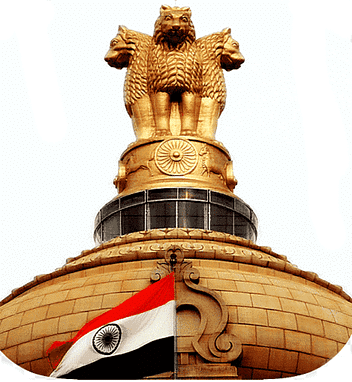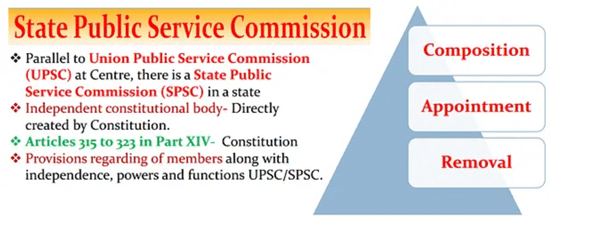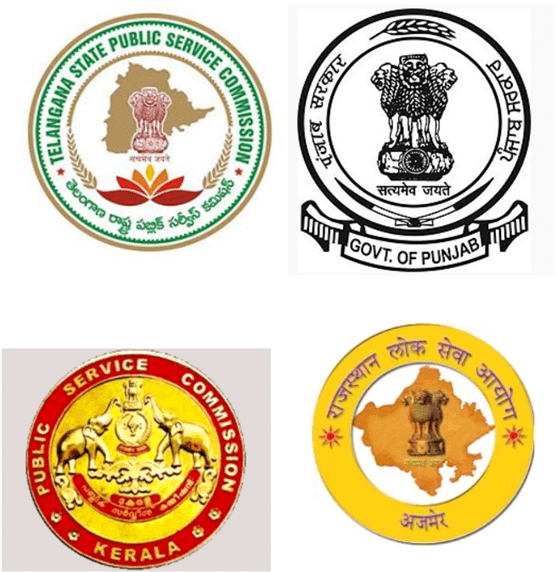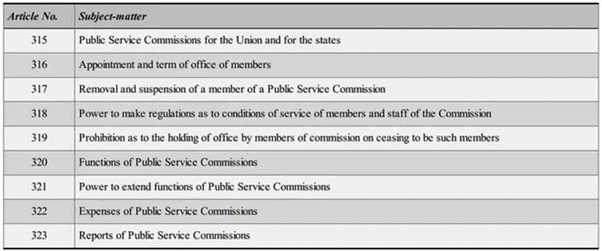UPSC Exam > UPSC Notes > Indian Polity for UPSC CSE > State Public Service Commission
State Public Service Commission | Indian Polity for UPSC CSE PDF Download
State Public Service Commission: Powers, Functions and Responsibilities

- The State Public Service Commission is also a constitutional body. There is a State Public Service Commission in every state.
- The same set of Articles (i.e., 315 to 323) of the Constitution also deal with the composition, appointment and removal of members, power and functions and independence of a State Public Service Commission.

Composition
- UPSC/SPSC consists of a chairman and other members appointed by President/Governor.
- UPSC consists of 9-11 members including the chairman - SPSC Constitution does not specify.
- No qualifications are prescribed for Commission’s membership except that one-half of the members should have held office for at least ten years under the Government of India or a state.
- The Constitution authorises President/Governor to determine conditions of service of chairman and other members of the Commission.
- Chairman and members of the Commission hold office for a term of six years or until they attain the age of 62 years (UPSC - 65 years).
- They address their resignation to the president/governor.
- They can also be removed before the expiry of their term by the president in the manner provided in the Constitution.
- President/Governor can appoint one of the members of UPSC/SPSC as an acting chairmanunder two circumstances:
- (a) When the office of chairman falls vacant; or
- (b) When the chairman is unable to perform his functions due to absence or some other reason.
- Acting chairman functions until a person appointed as chairman enters on duties of office or until the chairman is able to resume his duties.

Removal
- Their removal is solely the responsibility of the president (not the governor).
- The president can remove the chairman or any other member of UPSC/SPSCunder certain circumstances:
- If he is adjudged an insolvent (that is, has gone bankrupt);
- If he engages, during his term of office, in any paid employment outside the duties of his office;
- If he is, in the opinion of the president, unfit to continue in office by reason of infirmity of mind or body.
- Additionally, the president can remove the chairman or any other member of UPSC/SPSC for misbehaviour.
- In such cases, the president must refer the matter to the Supreme Court for an enquiry.
- Advice tendered by the Supreme Court in this regard is binding on the president.
- During the course of an enquiry by the Supreme Court, the Governor (not the president) can suspend the chairman or member of UPSC.
Independent & Impartial functioning
- Chairman or Member of UPSC/SPSC can be removed from office by the president only in the manner and on grounds mentioned in the Constitution.
- Service of the chairman or a member, though determined by the Governor, cannot be varied to his disadvantage after his appointment.
- Entire expenses including the salaries, allowances, and pensions of the chairman and members of the SPSC are charged on the Consolidated Fund of State.
- Chairman of SPSC is not eligible for further employment in Centre or state.
- Is eligible for appointment as chairman or a member of UPSC or as the chairman of any other SPSC.
- Member of SPSC is eligible for appointment as chairman of UPSC or a State Public Service Commission (SPSC).
- SPSC is eligible for appointment as the chairman or a member of the UPSC, or as the chairman of that SPSC or any other SPSC.
- But not for any other employment in the Government of India or a state.
- Chairman or a Member of SPSC is not eligible for reappointment to that office (i.e., not eligible for the second term).
Functions
- Conducts examinations for appointments to – services of the state.
- All matters relating to methods of recruitment to civil services and for civil posts.
- Principles to be followed in making appointments to civil services and posts and in making promotions and transfers from one service to another.
- Matters related to grant of extension of service and re-employment of certain retired civil servants.
- Jurisdiction of SPSC can be extended by an act made by State Legislature.
- SPSC presents, annually, to the Governor a report on its performance.
- President places this report before both the Houses of -> both the Houses of the state legislature
Question for State Public Service CommissionTry yourself: What is one of the key functions of the State Public Service Commission?View Solution
Outside jurisdiction of the SPSC
- Making reservations of appointments– Backward class/ SC/ ST.
- Claims of scheduled castes and scheduled tribes in making appointments to services and posts.
- Governor can exclude posts, services and matters from purview – SPSC.
- But Constitution states that- all such regulations made by the governor shall be laid before each House of the state legislature for at least 14 days.
- The state legislature can amend or repeal them.
Role

- Watch-dog of merit system.
- The role of SPSC is not only limited but also recommendations made by it are only of advisory nature and hence, not binding on the government.
- The emergence of the State Vigilance Commission (SVC) in 1964 affected the role of SPSC in disciplinary matters - Conflicting advise.
- SPSC, being an independent constitutional body, has an edge over the SVC, which is created by an executive resolution of the Government of State and conferred a statutory status.
The document State Public Service Commission | Indian Polity for UPSC CSE is a part of the UPSC Course Indian Polity for UPSC CSE.
All you need of UPSC at this link: UPSC
|
166 videos|999 docs|259 tests
|
FAQs on State Public Service Commission - Indian Polity for UPSC CSE
| 1. What are the main powers of the State Public Service Commission? |  |
Ans. The main powers of the State Public Service Commission include conducting examinations for recruitment to various state services, advising the state government on matters related to personnel management, and overseeing the appointment and promotion of state government employees. They also ensure the adherence to rules and regulations during the recruitment process.
| 2. What functions does the State Public Service Commission perform? |  |
Ans. The State Public Service Commission performs several key functions, including organizing competitive examinations for state civil services, conducting interviews for recruitment, preparing eligibility criteria for candidates, and providing guidance to the government on service matters. They also handle grievances related to recruitment and appointment processes.
| 3. What responsibilities does the State Public Service Commission have towards candidates? |  |
Ans. The State Public Service Commission is responsible for ensuring a fair and transparent selection process for candidates. This includes publishing notifications for examinations, providing clear guidelines and syllabi, conducting assessments in an unbiased manner, and delivering timely results. They also address any queries or complaints raised by candidates regarding the recruitment process.
| 4. How does the State Public Service Commission ensure transparency in its operations? |  |
Ans. The State Public Service Commission ensures transparency by publicly announcing examination dates, results, and selection criteria. They maintain a website where candidates can access important information and updates. Additionally, the commission often conducts open sessions and public hearings to address concerns and enhance accountability.
| 5. What is the significance of the State Public Service Commission in state governance? |  |
Ans. The significance of the State Public Service Commission in state governance lies in its role in recruiting qualified personnel for the state government, which is crucial for effective administration. By ensuring a merit-based selection process, the commission helps maintain the integrity and efficiency of the civil services, ultimately contributing to good governance and public service delivery.
Related Searches





















